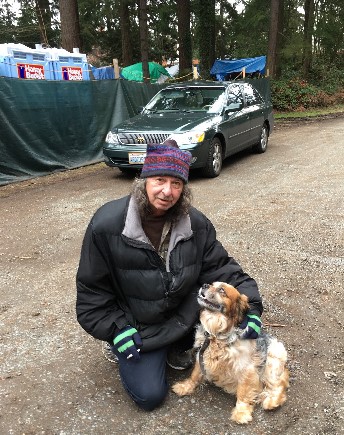By Christy Houghton
I’m a new writer for Greater Seattle Cares (GSC). This is my first article. Before volunteering with GSC, my experience with the homeless came from the TV news, and seeing (and smelling) drunk and dirty people begging on the streets near Pike Place Market or Pioneer Square in Seattle. So, when I made my first visit to Camp United We Stand, an organized, self-managed transitional encampment in Shoreline, I was in for some surprises.
Safer Than My Own Neighborhood
I live in the suburbs, where a woman can walk alone at night - alert, but unafraid. My neighborhood, though, doesn't have anywhere near the level of security that I found at Camp United We Stand. Only one entrance to the small homeless encampment; and before going in further, a camp resident politely insisted that I write the time, my name, and purpose for the visit in their guest notebook. He also warned me that no alcohol or drugs are permitted in the camp.
Wary but Welcoming
Before my visit, I told myself that I had no business at a homeless camp, and the people there would resent my presence. I’d thought that homeless people preferred to be invisible in our society, and steeled myself for hostility or at least indifference. Then I met Christopher, Tom, Monty, and Isaac. They welcomed me to the camp with kindness, and willingly posed for pictures after hearing that I was a new writer for GSC. I learned that just like everyone else, they want to be seen and heard and respected.
 |
| Isaac and Bowser, outside of Camp United We Stand |
Everyone I met appeared as clean as people without a shower on premises could possibly be expected to look. The camp was well-maintained, orderly, and spotless. If I hadn’t known it was a homeless camp, I might’ve asked about the campground rates.
Some Problems are Small Enough to Fix
Christopher was one of the three resident ECs (elected Executive Council member) that week, and in charge. When he showed me the Donation Tent, Christopher pointed out that they were short on men’s pants, sizes 30-39. They also needed a stapler before Move Day. I have an extra stapler at home. I had thought that if you help the homeless, you enable the homeless problem to continue. Greater Seattle Cares helped me see that people must have their basic needs of food, clothing, shelter, and safety met before they can even think about next steps to improve their lives.
Even Little Things Make a Difference
Before volunteering as a writer for GSC, I worried that it would make me feel bad to know more about the homeless problem because it’s so big that I couldn’t make a difference. I learned that even little things make a difference. Listening to someone, and speaking with respect and warmth. Writing about real people in our community, who want to be seen and heard. I can do these things.

